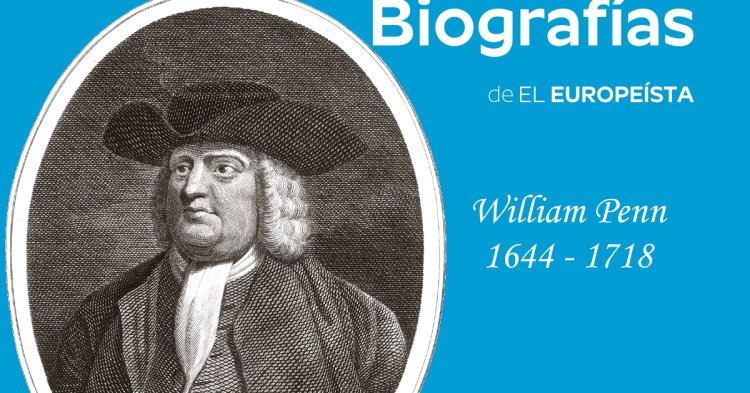William Penn was born on October 1644 in London, during the first of the English civil wars. His own home was already a display of European multiculturalism, as his father was an English admiral and his mother a Dutch woman from a family of merchants in Rotterdam.
During his youth, coincident with the Oliver Cromwell’s republic, Penn lived in Ireland and then returned to England where he studied at Oxford. It was this environment where he came into contact with the Religious Society of Friends, popularly known as ’Quakers’. This name came as a way to ridicule their ideology, since it comes from the word quake (tremor) and referred to their supposed cowardly attitude, although the same Quakers adopted the term and changed its meaning again. The Quaker ideology, which is of progressive nature, attracted Penn because of its pacifist tendency and opposition to the repression of religion.
Penn had the luck - or the misfortune - of being raised in a very turbulent time in the European history. Multiple wars came up one after another: the English civil wars, the War of the 30 Years, the Franco-Spanish War, the War of Flanders...
From his entry into the Religious Society of Friends, he dedicated himself to travel to Ireland and Germany as a missionary while writing pamphlets criticizing the Catholic as well as the Anglican Church and the Puritans. This activity led to his arrest in 1668, and his imprisonment in the Tower of London.
In the face of imminent death, Penn’s father paid bail for his son, so he could see him one last time and leave the differences that had separated them behind (Admiral William Penn, a man with a career in military and of great discipline, had never accepted that his son joined the Quaker pacifists).
Before his death, Admiral Penn asked the Duke of York (heir to the throne) to protect his son by naming him a royal adviser. In the 1670s, Penn proposed to the King and the Duke of York the mass migration of Quakers from England to North America to put an end to the religious conflict. Thus, Penn and a large group of Quakers moved in 1677 to Western Jersey. In 1681, the king of England gave Penn a vast area of land (which turned him into the greatest landowner in the world) that would initially receive the name of ’Sylvania’, a name which Charles II of England would later change to ’Pennsylvania’ in honour of Admiral Penn.
William Penn endowed the young province with a charter of liberties, the so-called Frame of Government, which established a bicameral legislature (Provincial Council and General Assembly) elected by the freemen of the province, as well as setting multiple rights (trial with jury, compulsory education, free elections) and liberties (religious, of private property). This document was later used as a model for the drafting of the Constitution of the United States of America in 1788 and marks a milestone in the history of modern democracy since it is the first document of its kind.
Although Pennsylvania was initially established with the intention of creating a territory for the Quakers, oppressed minorities from all over Europe (such as Huguenots, Mennonites, Amish, Jews, etc.) soon started to come there. This American colony became the maximum exponent of the slogan “United in Diversity”.
Throughout the last two decades of the century, Penn had to manage various problems in the colony. At the same time, he dedicated himself to participating in reformist political campaigns in England with a prospect of establishing greater freedom of religion and thought.
It was during this period - in 1693 - that this thinker published his work An Essay Towards the Present and Future Peace for Europe in which he proposes the creation of a kind of a council or parliament for what he calls a League or European Confederation. It was not a simple idea, Penn had everything thought-out; from the layout of the room where the deliberations would take place (round, in order to prevent anyone from feeling more or less important than the others, and with doors at all the opposite ends), over the working language, which he thought should be Latin or French, all the way to the voting rules. The motivation of his proposal? To achieve peace in a continent as marked by fratricidal wars as Europe was at that time.
The document maintains its validity even today, since it even addresses the issue of political corruption, a subject unfortunately so present in our society.
Although Penn’s progressive management had turned Pennsylvania into a prosperous colony at the economic and cultural level, the problems of foreign policy led him to return to England in 1701. From that moment his life was deteriorated and ended in misery when he died in 1718.


Follow the comments: |
|
